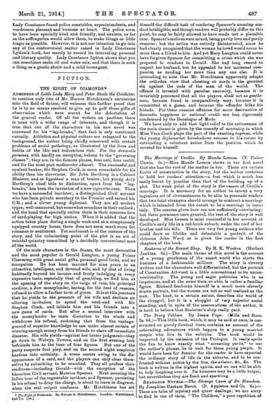FICTION.
THP EIGHT OF DLIMONDS.•
ADMIRERS of Little Lady Mary and Peter Steele the Cricketer, to mention only two of Mr. Horace Hutchinson's excursions into the field of fiction, will weloome this further proof that he is by no means resolved to give up to golf those gifts of observation which were meant for the delectation of the general reader. Of all the writers on pastime, there is none with a wider range of interests, and though it is tree that one of the characters in his new novel was renowned for his "leg-breaks," that fact is only mentioned casually. Athletics and physical culture are relegated to the background, the author being chiefly concerned with certain problems of social pathology, as illustrated by the lives and habits of the idle and industrious rich. For the dramatis personae, with hardly an exception, belong to the "governing , classes"; they are, in the famous phrase, bone nail, bone vestal, and for the most part mediocriter educati. The successful and opulent banker, Sir Stephen Craik, is more remarkable for his ability than his cleverness. Sir John Barthrop is a Cabinet .Minister, and es hypolltesi a man of brains; but young Arty Barthrop's chief title to distinction, apart from the " leg- breaks," has been the invention of a new cigarette-case. Then we have a successful barrister; a distinguished Civil servant who has been private secretary to the Premier and earned his O.B. ; and a clever young diplomat. They are all modern types; well-mannered, but somewhat mundane in their outlook; and the bond that specially unites them is their common love of card-playing for high stakes. When it is added that the action takes place during a single week-end at a sumptuously equipped country house, there does not seem much room for romance or sentiment. Yet sentiment is of the essence of the story, and the culminating point of the plot is an act of suicidal quixotry committed by a decidedly conventional man of the world.
Of the male characters in the drama, the most decorative and the most popular is Gerald Langton, a young Prince Charming with great social gifts, personal good looks, and no occupation. He has been married for nine years to an attractive, intelligent, and devoted wife, and by dint of living habitually beyond his income and freely indulging in every expensive taste, especially that of gambling, we find him at the opening of the story on the verge of ruin, his principal creditor, a Jew moneylender, having, for the best of reasons, refused to allow a further term of grace. It is at, this juncture that he' yields to the pressure of his wife and declines an alluring invitation to spend the week-end with Sir Stephen Oraik, and initiate him and his friends into a new game of cards. But after a second interview with the moneylender he oasts discretion to the winds and withdraws his refusal, reckoning that from the vantage. ground of superior knowledge he can make almost certain of winning enough money from his friends to stave off immediate disaster. His wife yields—against her better judgment—they go down to Welwyn Towers, and on the first evening luck befriends him to the tune of four figures. But one of the party suspects foul playrand on the second night suspicion hardens into certainty. A scene occurs owing to the dis- appearance of a card, and the players can only clear them- selves by submitting to be searched. They all profess their readiness—including Gerald—with the exception of the blameless Civil servant, Maurice Spencer. Next morning the ladies hear of the regrettable incident, and Spencer, persisting in his refusal to deny the charge, is about to leave in disgrace, when the real culprit confesses. Mr. Hutchinson has set ' • 211 Bight of Dianoads. By Hdracm G Matehlasion. Leaden: Ilatalthison and CO* 1.68J himself the difficult task of rendering Spencer's amazing con- duet intelligible, and though readers will probably differ on this point, he may be fairly allowed to have made out a plausible case. Spencer'smotives were mixed, being partly love and partly remorse; but the action was entirely disinterested, since he had clearly recognized that the woman he loved would never be more than a friend to him. And yet Mary Langton could never have forgiven Spencer for committing a crime which she VMS prepared to condone in Gerald. She ha¢ long ceased to respect her husband, but he appealed to her maternal com- passion as needing her more than any one else. It is interesting to note that Mr. Hutchinson apparently adopts the orthodox view that cheating at cards is the greatest sin against the code of the man of the world. The offence is invested with peculiar enormity, because it is invariably presumed that all the players shall act as gentle- men, because fraud is comparatively easy, because it is committed at a game, and because the offender bilks his friends. For these reasons offences far more destructive of domestic happiness or national credit are less rigorously condemned by the Decalogue of Mode.
We have only to add that light relief to the seriousness of the main theme is given by the comedy of courtship in which Miss Vera Craik plays the part of the exacting ingefraw, while the- young diplomatist foreshadows success in -his career by extricating a reluctant tuber from the position which he
coveted for himself. •










































 Previous page
Previous page